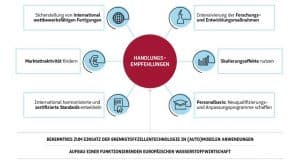National Platform Future of Mobility reveals its position paper
The chances of fuel cell technology making a breakthrough in mobility applications are looking good. Various developments are helping the rollout, expansion and deployment of fuel cell technologies in many different areas of the transportation sector. These include the technological maturity of the automotive industry, potential synergies in connection with other hydrogen applications and sectors, considerable changes to the regulatory framework and new political ambitions, as articulated in Germany’s national hydrogen strategy. But how is the German and European vehicle manufacturing industry poised when it comes to fuel cells?
If climate goals are to be reached, major new technologies will be required that have the potential to significantly reduce emissions. While battery electric power systems represent one option, electric propulsion based on hydrogen and fuel cells is another alternative which is particularly suited to applications with high performance and energy requirements or where the need to cover large distances is paramount. Example areas include long-haul and heavy-duty road transportation as well as applications in the maritime, aviation and rail sectors.
For Germany and Europe to carve out a leading role in the field of fuel cell technologies, however, there needs to be a sustained increase in the global competitiveness of vehicle manufacturing and the competitiveness of German and European industry overall. That’s the stance of the recently published position paper of Germany’s National Platform Future of Mobility, otherwise known as NPM. The position paper sets out a qualitative analysis of the status quo in terms of the value network for the production of fuel cells and their components, with a focus on the automotive field.
Value creation process in the spotlight
The first level of the analysis looked at the individual steps of value creation depth. Here, a description was given of each separate step in the process: from raw materials, membrane electrode assembly, the manufacture of bipolar plates through to stack and system assembly and recycling. For each of these central value creation stages, a second level of analysis and assessment was applied to aspects such as the scientific foundation, the development and production know-how, the recruitment and development of staff, sustainability and environmental responsibility, the basis and readiness for investment as well as issues surrounding energy use and performance. The expert assessment focuses on an evaluation of the current situation with regard to current competitiveness in Germany and Europe and also provides a forecast based on the assumptions made about future changes in competitiveness “in 10 years” within an international context. Performing the analysis were the members of NPM’s Working Group 4, whose remit encompasses “securing Germany as a place for mobility, production, battery cell production, primary materials and recycling, training and qualification,” and other specially invited experts from academia and industry.
… Read more in the latest H2-International e-Journal, Aug 2021
Author: Elisa Reker-Gluhic, acatech, Munich, Germany

























0 Comments